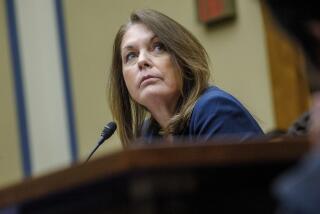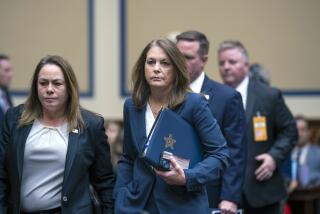Altman Denies He Misled Congress in Whitewater Probe
- Share via
WASHINGTON — Deputy Treasury Secretary Roger Altman, resisting Republican demands for his resignation, Monday strongly defended himself against allegations that he misled Congress about contacts between the White House and Treasury officials who were overseeing the government’s Whitewater investigation.
Altman took the offensive on the eve of congressional hearings into allegations that he and other top officials responsible for the investigation by the Resolution Trust Corp. had improperly transmitted information about the inquiry to President Clinton’s advisers at the White House.
Citing a recent statement by Whitewater special counsel Robert B. Fiske Jr., who chose not to prosecute officials involved in the Treasury Department’s contacts with the White House, Altman declared that he did nothing illegal or unethical. He also received a vote of confidence from Clinton and Treasury Secretary Lloyd Bentsen.
“I believe that Roger Altman has been an excellent deputy Treasury secretary and we want him to continue in that capacity,” Clinton and Bentsen said in their joint statement.
On Feb. 24, Altman--a personal friend of the President--acknowledged under questioning by the Senate Banking, Housing and Urban Affairs Committee that he had discussed the RTC investigation with White House officials on one occasion earlier that month.
At the time, Altman was acting head of the RTC, which was looking into possible links between Clinton’s investment in the Whitewater resort development in the 1970s and a failed Arkansas savings and loan owned by Clinton’s investment partner, James B. McDougal.
When he testified, Altman said Monday, he was unaware of similar discussions that Treasury General Counsel Jean Hanson had had with the White House. Hanson is expected to tell House and Senate committees conducting the Whitewater hearings that she discussed the matter with White House officials the previous fall at Altman’s request.
Hanson’s story has caused Sen. Alfonse M. D’Amato of New York and other Republicans to conclude that Altman intentionally misled the Senate Banking Committee. As a result, GOP members are demanding Altman’s resignation from his job as the No. 2 official at the Treasury Department.
But Altman made it clear that he will not give up easily. “As far as taking the fall is concerned, I don’t expect to do that,” he said.
Altman told reporters that he had no recollection of asking Hanson to brief White House officials about the Whitewater-related investigation but he stopped short of accusing her of lying. He said he was unaware of Hanson’s claim until recently.
“My testimony was correct,” Altman said. “I have no recollection of asking Ms. Hanson to brief the White House. There is nothing unusual for recollections to differ. The events in question occurred five months before my testimony. I know that she has a different recollection. I just disagree.”
As acting RTC head until last March 31, Altman was technically responsible for the agency’s investigation into allegations that money from the failed Madison Guaranty Savings and Loan was diverted by McDougal to his joint Whitewater investment with Clinton.
But Altman insisted that he never knew anything about the substance of the investigation and that he did not discuss it in detail with White House officials. Instead, he said, he simply briefed then-White House Counsel Bernard Nussbaum on the publicly acknowledged procedures that the RTC would be using to investigate Clinton’s controversial investment.
“At a more significant level,” he added, “I made no decisions and never influenced the direction or the substance of the Madison case at any time during my tenure at the RTC. And I never imparted any non-public information about the case to the White House or anyone else.”
Altman also denied a number of other recent news reports about his knowledge of the Whitewater inquiry and his role in advising the White House about it.
Among other things, he disputed a statement that Joshua L. Steiner, Bentsen’s chief of staff, reportedly wrote in a personal diary. According to those who have read the diary, Steiner wrote that White House officials had put heavy pressure on Altman not to recuse himself from playing a role in the Whitewater matter.
On Feb. 25, one day after testifying before the Senate Banking Committee about his discussions of the Whitewater investigation with White House officials, Altman announced that he was removing himself from any further official involvement in the case. The announcement apparently took the White House by surprise.
On Monday, Altman insisted that his recusal was only a perfunctory step because he had already told RTC officials that he wanted to play no part in the Whitewater case. As a result, he said, he was never privy to any inside information about the substance of the case.
After he recused himself, Altman said, he received a call from White House aides George Stephanopoulos and Harold M. Ickes, who told him that the President was angry that he had not been notified in advance. As a result, he said, he regretted his failure to warn the White House.
Altman also denied reports that a former RTC official told him in March, 1993, that the RTC had referred the Whitewater case to the Justice Department for possible criminal prosecution. “I firmly believe that he did not do so. That is my recollection,” he said.
At the same time, Altman did acknowledge reports that he has surrendered to congressional investigators several pages of his so-called “scrapbook,” in which he is said to have written that First Lady Hillary Rodham Clinton strongly opposed the appointment of a special counsel to investigate the Whitewater matter.
Contrary to some reports, Altman said, he does not keep a diary. He said that the scrapbook, which includes newspaper clippings, documents and occasional handwritten comments, contained no more than a few sentences pertaining to Whitewater.
Altman declined to say exactly what he had written in the scrapbook about the First Lady, but he noted that he had already apologized to her for any embarrassment his remarks might cause her when--and if--they are made public during the congressional hearings.
He also told reporters that both the President and Mrs. Clinton have told him on separate occasions that he should not be concerned about the political ruckus that his Whitewater-related activities have caused on Capitol Hill.
Hearings into the matter begin today with the testimony of White House Counsel Lloyd N. Cutler before the House Banking, Finance and Urban Affairs Committee. Another session is scheduled for Thursday, with three more next week. The Senate Banking Committee starts its Whitewater hearings Friday.
Preview of House Hearings
The House Banking Committee begins its inquiry today, while the Senate banking panel will follow with separate hearings on Friday.
AT A GLANCE
WHEN: 6:30-8 a.m. Pacific time
COVERAGE: Live on C-Span and CNN
FIRST WITNESS: White House counsel Lloyd Cutler, who is conducting his own investigation of Administration conduct.
PROCEDURE: After panel Chairman Henry Gonzales has run through his witness list, ranking GOP member Jim Leach can summon witnesses, although he does not have subpoena power.
MAIN TOPIC: Contacts between Treasury officials and the White House regarding the investigation by the Resolution Trust Corporation of Madison Gauranty Savings and Loan.
BACKGROUND: Whitewater is the term used to describe dealings involving the Clintons’ failed real estate venture with Arkansas friend and political ally James McDougal, the eventual failure of McDougal’s Madison Guaranty, a state-chartered thrift association, and the July, 1993, suicide of Clinton legal adviser and friend Vincent Foster.
Panel Chairman: Henry Gonzales (D-Tex.)
Ranking GOP member: Jim Leach (R-Iowa)
Sources: Times staff and wire reports
More to Read
Get the L.A. Times Politics newsletter
Deeply reported insights into legislation, politics and policy from Sacramento, Washington and beyond. In your inbox twice per week.
You may occasionally receive promotional content from the Los Angeles Times.










